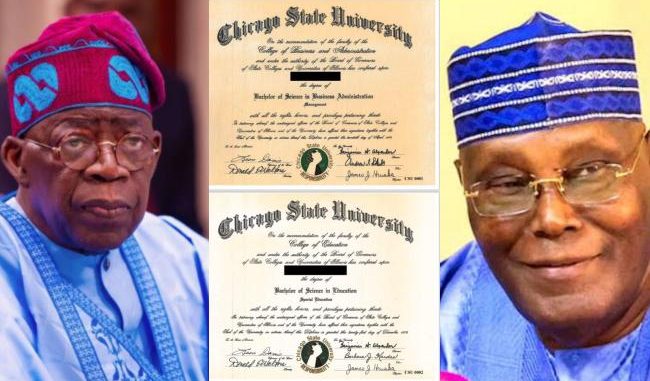
Atiku Abubakar, presidential candidate of the Peoples Democratic Party (PDP), has submitted the evidence of President Bola Tinubu’s forgery to the Supreme Court where he seeks to overturn the president’s election victory.
Mr Abubakar, on Thursday, prayed the apex court for leave to “receive fresh and/or additional evidence by way of deposition on oath from the Chicago State University for use in this appeal to wit; the certified discovery deposition made by Caleb Westberg on behalf of Chicago State University on October 3, disclaiming the certificate presented by the 2nd respondent, Bola Ahmed Tinubu, to the Independent National Electoral Commission (INEC).
The PDP candidate urged the senior court to admit his evidence, citing other instances in which Mr Tinubu’s attorney Wole Olanipekun’s new evidence was admitted by the highest court. He asserted the documents could not have been obtained earlier due to the legal red tape in the U.S., where he got them from.
On September 6, an opinion of a lower court, the presidential elections tribunal, struck out Mr Abubakar’s morass of petitions asserting they were too weak to unseat the president.
Undaunted, Mr Abubakar, approached a U.S. federal court to subpoena CSU for Mr Tinubu’s educational records in his quest to prove that the diploma Mr Tinubu tendered to Nigeria’s electoral body, INEC, was a forgery.
The CSU registrar, Mr Westberg, swore under oath that Mr Tinubu did, in fact, attend and graduate from CSU, but that the university is unable to vouch for the authenticity of the diploma that was submitted to INEC because they did not issue it.
The legal team for Mr Abubakar, led by senior attorney Chris Uche, has now submitted the deposition of Mr Westberg’s testimony to the Supreme Court.
Citing the case of UZODINMA vs. IZUNASO (2011), Mr Abubakar reminded the apex court of its decision to allow Mr Olanipekun admit new evidence in his appeal after pleading that he could not assemble the evidence at the initial court of trial.
“Learned counsel for the Appellant, Chief W. Olanipekun SAN observed that trial took just three days and judgement was delivered on 28/l/2011, he thus had very little time to assemble relevant documentary evidence, including exhibit HU2.”
Then the apex court had ruled that “the discretion to grant leave to admit new evidence, fresh evidence or additional evidence” was “properly exercised” since it was for the “furtherance of justice.”
Leave a Reply